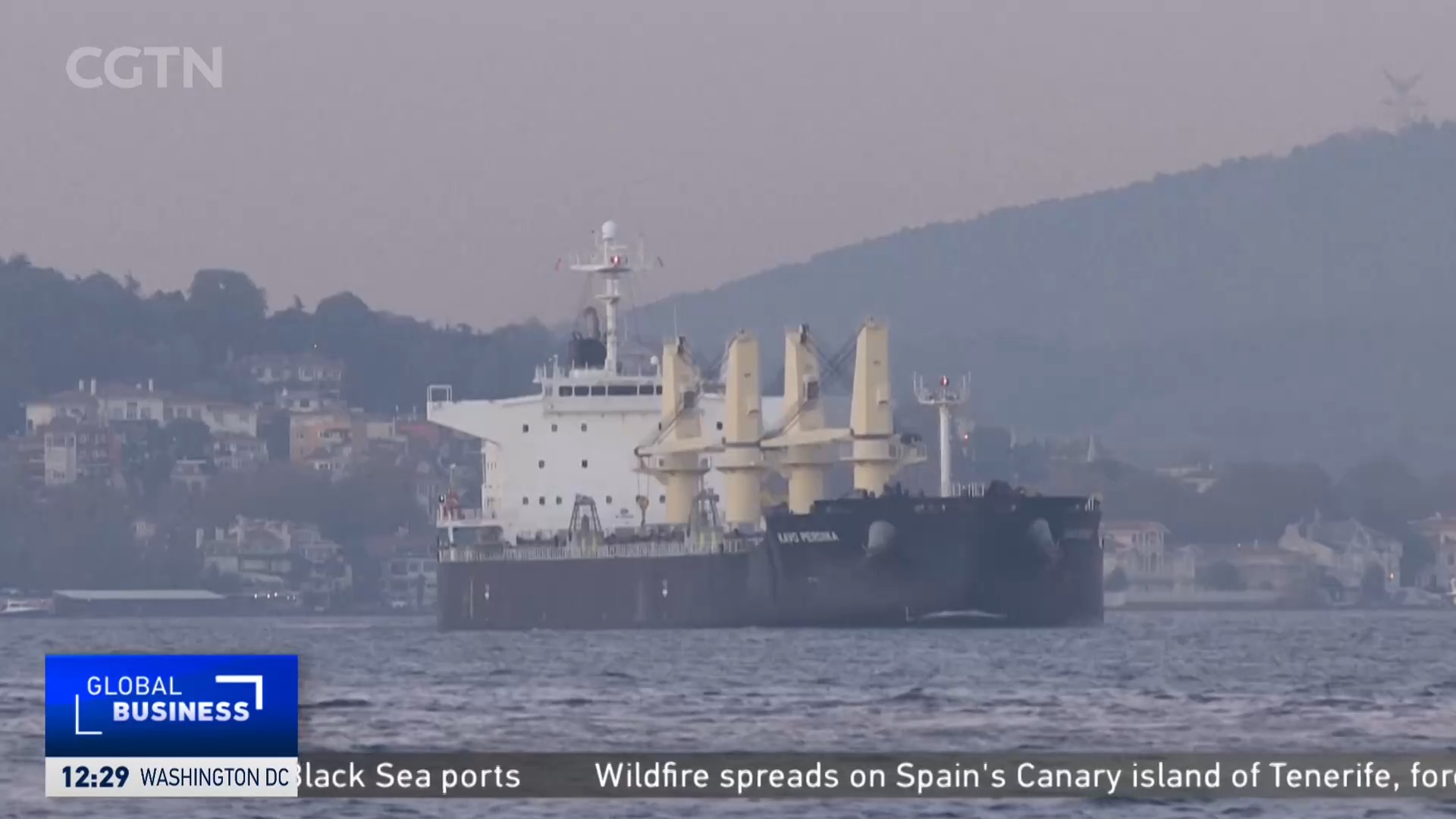03:05

Ukraine was once called the bread basket of Europe, but the ongoing conflict in the country has badly damaged its famous agricultural industry. With Russia pulling out of a deal last month to guarantee the safe passage of grain ships across the Black Sea, CGTN has been speaking to farmers and exporters looking at new ways to survive.
Overseas markets
With £20,000 Square kilometers of land under cultivation, over seventy percent of the landmass of Ukraine is given over to farming. As well as wheat, Ukraine is the world's biggest supplier of sunflower oil. Its other exports include corn, soybeans, potatoes and barley.
Before the outbreak of hostilities in February last year, international sales of agricultural goods from Ukraine were worth $27.8 billion annually, accounting for 41 percent of the country's total export trade. Its biggest overseas markets are China, Türkiye, Nigeria and above all Egypt, which spends over five billion dollars a year importing Ukrainian grain.
READ MORE
Afghan recalls tragic Channel crossing
Balkan Barbie: 11 year-old creates unique range
Crocodiles detect distress cries of human babies
The collapse last month of the UN brokered Black Sea grain deal that guaranteed safe routes for cargo ships leaving Ukrainian ports across the Black Sea, has dealt the industry a fresh blow.
CGTN spoke to Volodymyr Varbanets, a farmer in the Odesa region. He says that even before Russia pulled out of the Black Sea initiative, his business was in trouble.
"The war has had a massive impact on my farm," he says. "And not only on mine but generally on farms throughout Ukraine. Here in the Odesa region the cost of crops has fallen by fifty percent, but the cost of fuel and fertilizer have gone up by fifty percent."
The disruption to normal trade has led to a glut of grain on the local market. This has been made worse by a lack of storage facilities on many farms. While Mr Varbanets has a grain silo on his property over seventy percent of farms in the Odesa region do not, and instead rely on port capacity.

A grain warehouse destroyed by a Russian drone strike is seen in a sea port. /The Ukrainian Armed Forces
A grain warehouse destroyed by a Russian drone strike is seen in a sea port. /The Ukrainian Armed Forces
Drone strikes
Russia withdrew from the Black Sea grain deal on July 20th, claiming it offered insufficient safeguards for its own agricultural exports. Within days Ukraine's port facilities came under fire from a series of drone strikes by Moscow backed troops.
Dymytro Barnov of the Ukrainian Sea Ports Authority in Odesa told CGTN "We realized this from the beginning because... on July 23 we had shots and they hit (with) rockets on the port. Thank God nobody was killed ... but they showed they do not respect international agreements."
Initial hopes of creating new export routes via river ports in the Danube delta were dashed when grain-loading facilities were also hit by Russian drones on August 16. Other strikes followed, destroying 40,000 tons of grain supplies intended for Africa.
Despite the worsening outlook, Alla Stoyanova head of food policy at Odesa's State administration told CGTN that farmers are continuing to sow their crops.
"They understand that even in conditions of loss they have to survive this period. The state provides state incentives, we have state support of almost $33 million to support farms and agricultural businesses."
And she added that some Ukrainian farms are beginning to diversify. "We want to develop horticulture, grow berries and vegetables, as well as (create) irrigation systems" she said.

A worker prepares baked goods with wheat from Ukraine as his colleague rests at a bakery, in Hodan district in Mogadishu, Somalia July 16, 2023. REUTERS/Feisal Omar
A worker prepares baked goods with wheat from Ukraine as his colleague rests at a bakery, in Hodan district in Mogadishu, Somalia July 16, 2023. REUTERS/Feisal Omar
Humanitarian corridor
Last week, despite Moscow warning it could no longer guarantee the safety of vessels traversing Black Sea routes, Ukraine announced it was setting up a new "humanitarian corridor" in the waters, close to the Romanian and Bulgarian coast.
There was celebration when the Hong-Kong-flagged container ship the "Joseph Schulte" became the first vessel to complete the route, arriving safely in Istanbul. With dozens of cargo ships backed up in Ukraine's ports, Kyiv says it wants to build on this success.
Denys Marchuk, of Ukraine's Agrarian Council says "There should be a movement of potentially seven to eight more ships ... then perhaps in the future these alternative routes will become a corridor for the movement of ships that are traveling with cargoes of grain and oil seeds."
Volodymyr Zelenskyy has been meeting his Bulgarian counterpart Nikolai Denkov in Athens for further talks on the matter. Ukraine is reportedly close to finalizing a scheme with global insurers to cover these ships.
However, whether it is safe routes in the Black Sea, alternative river ports or costly road and rail options, Volodymyr Varbanets in Odesa warns help will come too late for many Ukrainian farmers and for the vulnerable consumers in Africa and Asia who depend on them.
"Twenty five to 30 percent of farmers may go bankrupt in 2024," he told CGTN. "They won't be able to sow grain or exist. They will be forced to either lease or sublease the land, or not plant anything at all.. And the land will become overgrown with weeds."

Subscribe to Storyboard: A weekly newsletter bringing you the best of CGTN every Friday
Cover image: Viacheslav Ratynskyi/Reuters